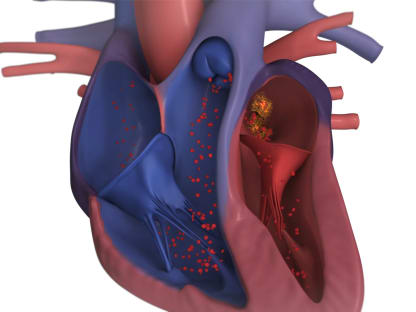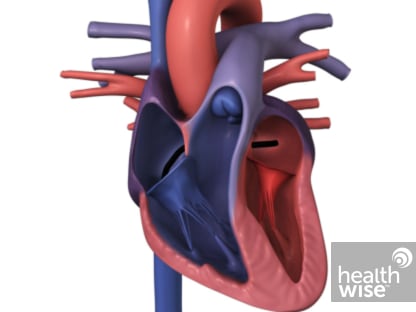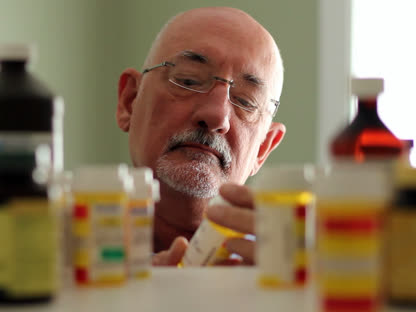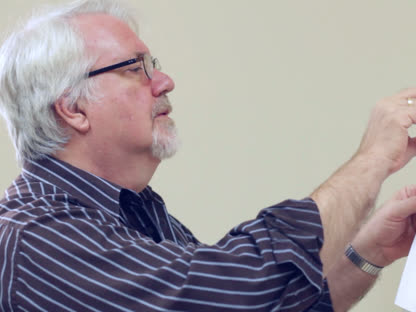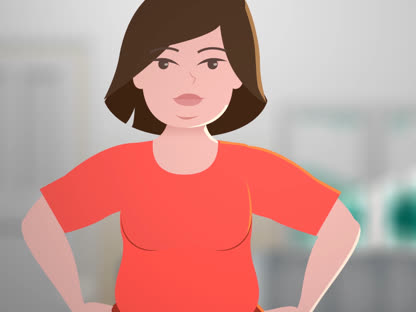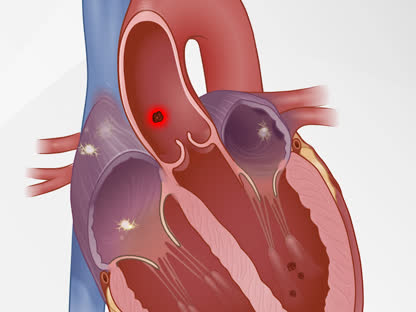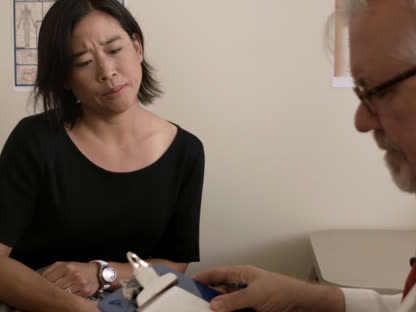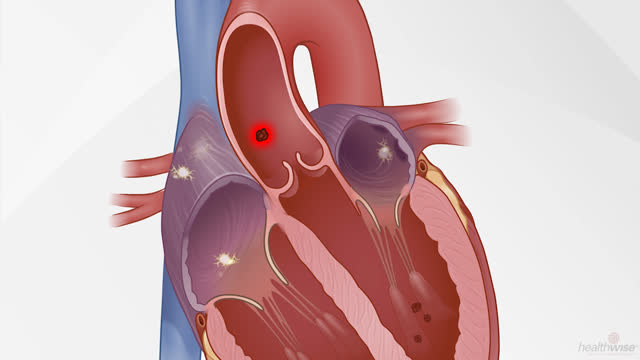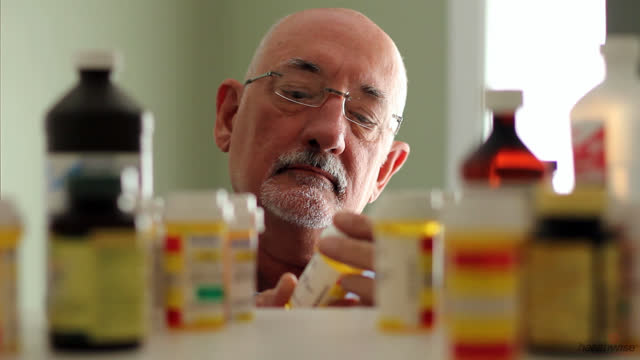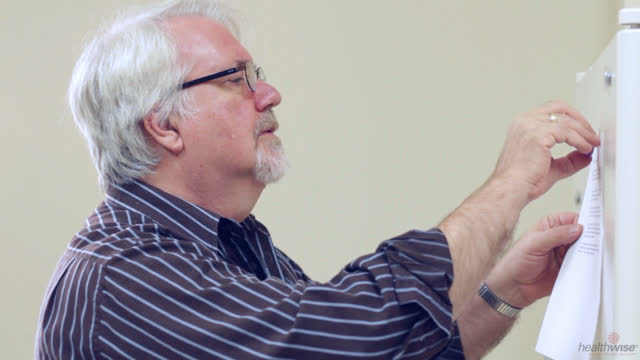Atrial Fibrillation
Condition Basics
What is atrial fibrillation?
Atrial fibrillation (say "AY-tree-uhl fih-bruh-LAY-shun") is a common type of irregular heartbeat (arrhythmia). Normally, the heart beats in a regular, steady rhythm. In atrial fibrillation, a problem with the heart's electrical system causes the two upper chambers of the heart (called the atria) to quiver, or fibrillate.
An episode of atrial fibrillation is not usually dangerous. But this condition can lead to problems. This is because blood can collect, or pool, in your heart if the heartbeat isn't regular and steady. And pooled blood is more likely to form clots. Clots can travel to the brain, block blood flow, and cause a stroke. Atrial fibrillation can also lead to heart failure.
This condition also upsets the normal rhythm between the atria and the lower chambers of the heart. (These chambers are called the ventricles.) The ventricles may beat fast and without a regular rhythm.
What causes it?
Atrial fibrillation is caused by health problems that damage or strain the heart and its electrical system. These problems include high blood pressure, coronary artery disease, and heart failure. Other causes include heart surgery, lung disease, or an overactive thyroid gland.
What are the symptoms?
Some people feel symptoms when they have episodes of atrial fibrillation. But other people don't notice any symptoms. There are a few different symptoms, such as feeling dizzy, tired, or short of breath. Some people feel a fluttering, racing, or pounding feeling in their chest (called palpitations).
How is it diagnosed?
To see if you have atrial fibrillation, you will have an electrocardiogram (EKG or ECG). An EKG is a test that checks for problems with the heart's electrical activity. Your doctor will do a physical exam. You may have other tests that check the health of your heart.
How is atrial fibrillation treated?
Treatments can help you feel better and prevent future problems, especially stroke and heart failure.
Your treatment may depend on the cause of your atrial fibrillation, your symptoms, your risk for stroke, and your preferences. Types of treatment include:
- Heart rate treatment. Medicine may be used to slow your heart rate. Your heartbeat may still be irregular. But these medicines keep your heart from beating too fast. They may also help relieve symptoms.
- Heart rhythm treatment. Different treatments may be used to try to stop atrial fibrillation and keep it from returning. They can also relieve symptoms. These treatments include:
- Medicine.
- Electrical cardioversion to shock the heart back to a normal rhythm.
- A procedure called catheter ablation.
- Heart surgery.
- Stroke prevention. You and your doctor can decide how to lower your risk. You may decide to take a blood-thinning medicine called an anticoagulant.
Health Tools
Health Tools help you make wise health decisions or take action to improve your health.
Cause
Atrial fibrillation is caused by a problem with the heart's electrical system. When something goes wrong with this system, it's usually because of other health problems that are causing wear and tear on the heart or making it hard for the heart to do its job.
Conditions that damage or strain the heart are the most common causes of atrial fibrillation. These include:
Other possible causes include:
- Having heart surgery or other open-chest surgery.
- Hyperthyroidism.
- Lung disease, such as COPD or pneumonia.
- Drinking a large amount of alcohol at one time (binge drinking).
In some cases, doctors can't find the cause of atrial fibrillation.
What Increases Your Risk
A risk factor is anything that increases your chances of getting sick or having a problem. Risk factors for atrial fibrillation include:
- Age older than 60.
- Being white and male.
- Obesity.
- Sleep apnea.
- A family history of atrial fibrillation.
- Other health problems that can cause atrial fibrillation. These include high blood pressure and certain heart problems.
Other things that can increase the risk for atrial fibrillation include:
- Long-term, heavy alcohol use, or drinking a large amount of alcohol at one time (binge drinking).
- Smoking.
- Not being active.
Symptoms
Some people feel symptoms when they have episodes of atrial fibrillation. But other people don't notice any symptoms.
If you have symptoms, you may feel:
- A fluttering, racing, or pounding feeling in your chest called palpitations.
- Weak or tired.
- Dizzy or lightheaded.
- Short of breath.
- Chest pain.
You may notice signs of atrial fibrillation when you check your pulse. Your pulse may seem uneven or fast.
What Happens
At first, episodes of atrial fibrillation may come on suddenly and last a short time. It may go away on its own or with treatment. Over time, the episodes may last longer and occur more often. They often don't go away on their own. During these episodes, you may feel symptoms such as palpitations, dizziness, or weakness.
An episode of atrial fibrillation is not usually dangerous. But this condition can lead to problems. This is because blood can collect, or pool, in your heart if the heartbeat isn't regular and steady. And pooled blood is more likely to form clots. Clots can travel to the brain, block blood flow, and cause a stroke. A fast, uncontrolled heartbeat also increases your risk for heart failure.
Treating atrial fibrillation is important, because treatment can relieve symptoms and lower your risk of stroke and heart failure.
Watch
When to Call a Doctor
Call 911 or other emergency services immediately if you:
- Have symptoms of a heart attack, such as chest pain or pressure, shortness of breath, and nausea.
- Have symptoms of a stroke, such as sudden vision changes; trouble speaking; or numbness, tingling, weakness, or loss of movement in your face or an arm or a leg.
- Feel faint and have an irregular heartbeat.
If you see someone pass out, call 911 or other emergency services immediately.
Call your doctor if you have:
- An irregular heart rate.
- Heart palpitations.
- Periods of unexplained lightheadedness, dizziness, or confusion.
- An episode of fainting or you come close to fainting for no apparent reason.
- Shortness of breath that gets worse with exercise.
If you take a blood thinner
If you take blood-thinning medicine, watch for signs of bleeding.
Call 911 or other emergency services immediately if you:
- Have a sudden, severe headache that is different from past headaches. (It may be a sign of bleeding in the brain.)
Call your doctor now if you have any unusual bleeding, such as:
- Nosebleeds.
- Vaginal bleeding that is different (heavier, more frequent, at a different time of the month) than what you are used to.
- Bloody or black stools, or rectal bleeding.
- Bloody or pink urine.
Exams and Tests
To see if you have atrial fibrillation, you will have an electrocardiogram (EKG or ECG). An EKG is a test that checks for problems with the heart's electrical activity.
Your doctor will probably ask questions about your past health and do a physical exam.
Other tests
Other tests your doctor may recommend include:
- Ambulatory electrocardiogram.
- For this test, a device records the electrical activity of your heart while you do your usual activities. You may have this test if your doctor suspects that you have atrial fibrillation that comes and goes. There are many different types of devices. Your doctor will recommend the type that is right for you.
- Electrophysiology (EP) study.
- This test can help your doctor see if there is a problem with your heartbeat (heart rhythm) and find out how to fix it.
- Exercise electrocardiogram.
- Also called a stress test, this test will help your doctor see if you have coronary artery disease.
- Echocardiogram.
- This test can show if your heart valves are damaged, how well your heart is pumping, and if you have heart failure or have had a heart attack.
- A blood test.
- You may have a blood test to check for hyperthyroidism.
Some people also use wearable devices or smartphone devices to check their heart rate and rhythm. These devices may be able to check for atrial fibrillation. But the results need to be confirmed by a doctor.
Learn more
Treatment Overview
Treatments for atrial fibrillation can help you feel better and prevent future problems, especially stroke and heart failure. Your treatment may depend on the cause of your atrial fibrillation, your symptoms, your risk for stroke, and your preferences.
The main types of treatment will:
- Slow your heart rate.
- Control your heart rhythm.
- Prevent stroke.
You can also help manage atrial fibrillation by having a heart-healthy lifestyle.
Atrial fibrillation caused by a condition that is treatable, such as hyperthyroidism, may go away when that condition is treated.
Treatment to slow your heart rate
- Rate-control medicines.
Rate-control medicines are used if your heart rate is too fast. They usually don't return your heart to a normal rhythm, so your heartbeat will still be irregular. But these medicines can keep your heart from beating at a fast rate.
These medicines may also relieve symptoms.
Treatment to control your heart rhythm
Treatment to control your heart rhythm is done to try to stop atrial fibrillation and keep it from returning. It may also help your symptoms. Treatments include:
- Rhythm-control medicines.
- These medicines are also called antiarrhythmics.
- Electrical cardioversion.
- This procedure uses a low-voltage electrical shock to return the heart to a normal rhythm.
- Catheter ablation.
This procedure, which is done with a thin tube called a catheter, destroys tiny areas in the heart that cause atrial fibrillation. Ablation can relieve symptoms and improve quality of life.
AV node ablation is another type of catheter ablation. It does not stop atrial fibrillation, but it can relieve symptoms.
- Maze procedure.
- This procedure is done through small cuts in the chest or during open-heart surgery. It creates scar tissue that blocks excess electrical impulses from traveling through your heart.
Treatment to prevent stroke
- Blood thinners.
- You may take a medicine, called an anticoagulant or blood thinner, to help prevent a stroke. This medicine prevents blood clots.
Your doctor can help you know your risk of a stroke based on your age and health. This information can help you and your doctor decide how to lower your risk.
- If you are at an average-to-high risk of having a stroke, taking an anticoagulant can lower this risk. You may decide that this benefit outweighs the risk of bleeding from this medicine.
- If you are at low risk of having a stroke or you can't take an anticoagulant, you may choose to not take a blood thinning medicine.
- Left atrial appendage closure.
- Left atrial appendage closure is a procedure that implants a small device in the heart. The device can lower the risk of stroke. The device closes off a small sac in the left atrium of the heart. This can prevent blood clots from moving out of the heart and causing a stroke. This procedure might be done in some people who cannot take a blood thinner.
Heart-healthy lifestyle
You can live well and help manage atrial fibrillation by having a heart-healthy lifestyle.
A heart-healthy lifestyle includes healthy eating, staying at a weight that is healthy for you, getting 7 to 9 hours of sleep each night, being active, and not smoking.
These healthy habits may help reduce how often you have episodes of atrial fibrillation. Regular physical activity may help relieve symptoms. If you are overweight, losing weight can also help relieve symptoms.
Learn more
Watch
Self-Care
Many people are able to live full and active lives with atrial fibrillation. Most people don't have to change their daily activities.
You can live well and help manage atrial fibrillation by having a heart-healthy lifestyle, taking medicine properly, and managing other health problems. You can work with your doctor to help manage your symptoms.
Have a heart-healthy lifestyle
A heart-healthy lifestyle can help keep your heart as healthy as possible. It may also help reduce how often you have episodes of atrial fibrillation. If you are overweight, losing weight can help relieve symptoms. Regular physical activity may also help relieve symptoms.
To have a heart-healthy lifestyle:
- Try to quit or cut back on using tobacco and other nicotine products. This includes smoking and vaping. Avoid secondhand smoke too.
- Eat heart-healthy foods. These include vegetables, fruits, nuts, beans, lean meat, fish, and whole grains. Limit sodium and sugar.
- Limit alcohol. Limit alcohol to 2 drinks a day for men and 1 drink a day for women. Avoid alcohol if it triggers symptoms.
- Talk to your doctor about what type and level of exercise is safe for you. Try to be physically active for at least 30 minutes on most days of the week. Walking is a good choice. You also may want to swim, bike, or do other activities.
- Stay at a weight that's healthy for you. Talk to your doctor if you need help losing weight.
- Try to manage stress. Treatments like yoga, biofeedback, and meditation may help.
- Try to get 7 to 9 hours of sleep each night.
Take medicine properly and safely
Taking medicine can help you feel better and prevent future problems.
- Take your medicines exactly as prescribed.
- If you take a blood thinner to prevent a stroke, be sure you get instructions about how to take your medicine safely. Blood thinners can cause serious bleeding problems.
- Talk with your doctor or pharmacist before taking any new medicine. Tell your doctor all of the medicines you take. Some prescription and nonprescription medicines can interact with your heart medicines.
Manage other health problems
Manage other health problems such as high blood pressure, high cholesterol, and diabetes.
Know the signs of sleep apnea. Tell your doctor if you have symptoms such as snoring and feeling sleepy during the day. Many people with atrial fibrillation also have sleep apnea.
Avoid infections such as COVID-19, colds, and the flu. Get the flu vaccine every year. Get a pneumococcal vaccine. If you have had one before, ask your doctor whether you need another dose. Stay up to date on your COVID-19 vaccines.
Talk with your doctor if you think you have a problem with alcohol or drug use. This includes prescription medicines (such as amphetamines and opioids) and illegal drugs (such as cocaine and methamphetamine).
Manage symptoms
Treatments for atrial fibrillation can relieve symptoms. But managing symptoms, or episodes, can be easier for some people than others. That's because some people only have mild symptoms, and they learn how to deal with them. But other people can struggle and they feel like their episodes are controlling their lives.
Work with your doctor to treat your symptoms. Tell your doctor how symptoms affect your life. Your doctor can help you find ways to manage episodes.
There are a few things you can try. They include:
- Making an action plan with your doctor. Then you'll have things to try when you have an episode. For example, you might try things that are calming, like breathing and relaxation exercises.
- Using a symptom diary. You can try to find out what triggers your symptoms. Then you can try to avoid your triggers if possible. For example, avoid alcohol if it triggers symptoms.
Learn more
Watch
Medicines
If you have atrial fibrillation, you may take medicine to help prevent a stroke. You may also take medicine that slows your heart rate or controls your heart rhythm.
Medicine to prevent a stroke
Your doctor can help you know your risk of a stroke based on your age and health. This information can help you and your doctor decide how to lower your risk.
Anticoagulant medicines, also called blood thinners, are recommended for most people with atrial fibrillation who are at average to high risk of stroke.
If you are at low risk of having a stroke, you may choose to not take an anticoagulant.
Anticoagulant choices include:
- Apixaban (Eliquis).
- Dabigatran (Pradaxa).
- Edoxaban (Savaysa).
- Rivaroxaban (Xarelto).
- Warfarin.
Medicine to slow your heart rate
Rate-control medicines are used if your heart rate is too fast. The medicine slows your heart rate.
These medicines include:
- Beta-blockers.
- Calcium channel blockers.
Rate-control medicines may relieve symptoms caused by the fast heart rate. But these medicines may not relieve other symptoms caused by atrial fibrillation.
Medicine to control your heart rhythm
Rhythm-control medicines (also known as antiarrhythmics) help return the heart to its normal rhythm and keep atrial fibrillation from returning. They may help relieve symptoms caused by an irregular heart rate.
Learn more
Watch
Credits
Current as of: July 31, 2024
Author: Ignite Healthwise, LLC Staff
Clinical Review Board
All Healthwise education is reviewed by a team that includes physicians, nurses, advanced practitioners, registered dieticians, and other healthcare professionals.
Current as of: July 31, 2024
Author: Ignite Healthwise, LLC Staff
Clinical Review Board
All Healthwise education is reviewed by a team that includes physicians, nurses, advanced practitioners, registered dieticians, and other healthcare professionals.
